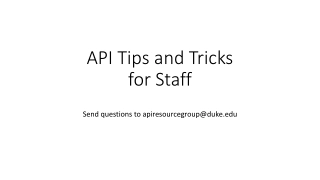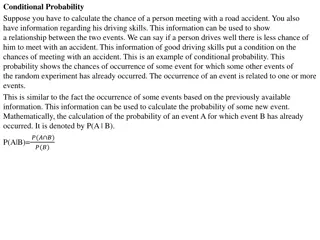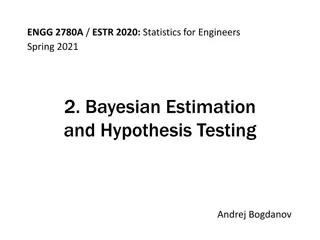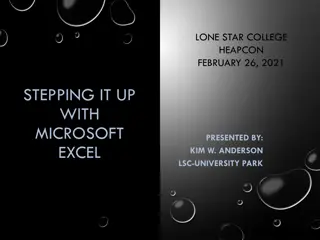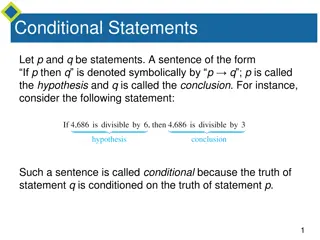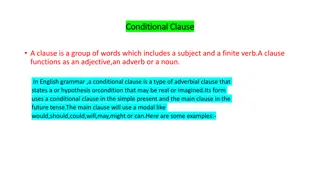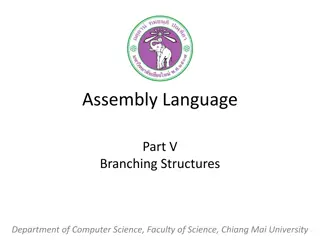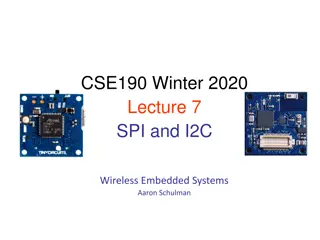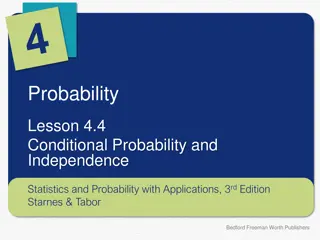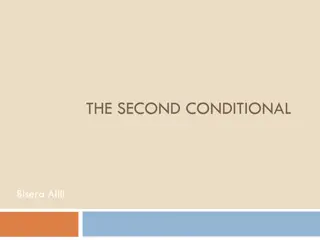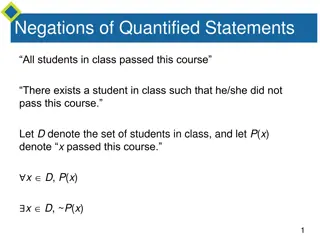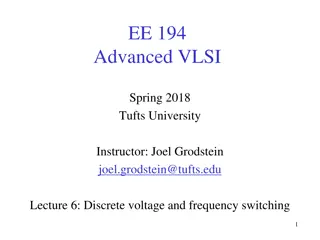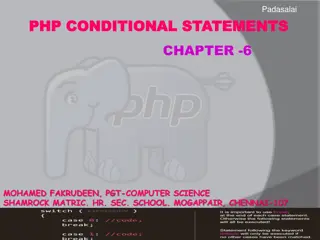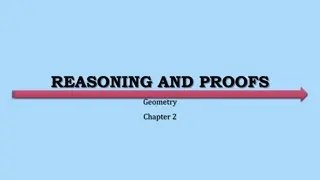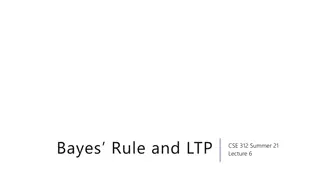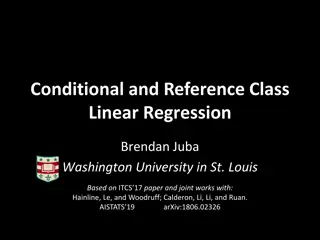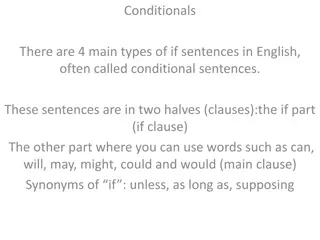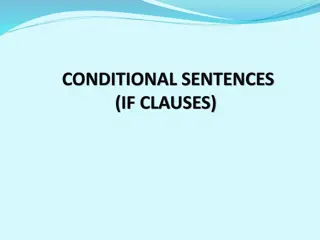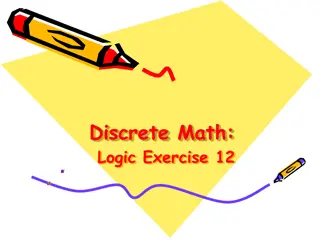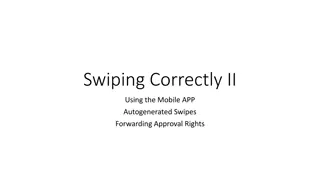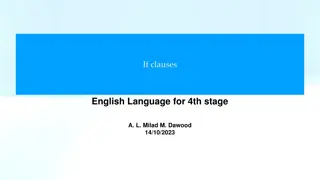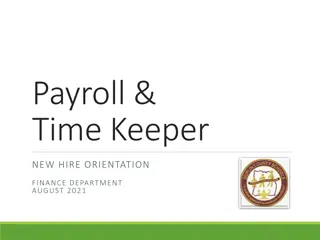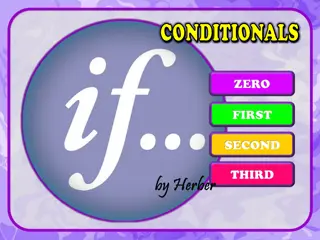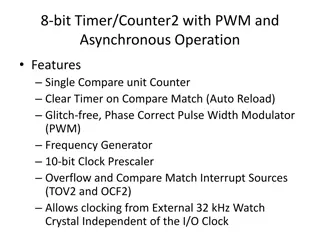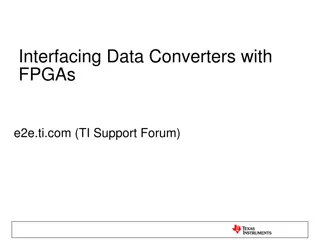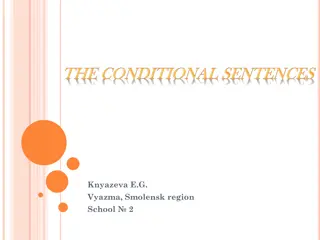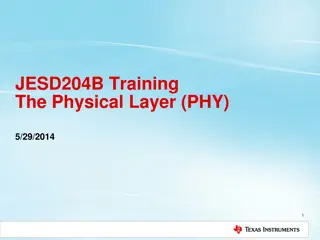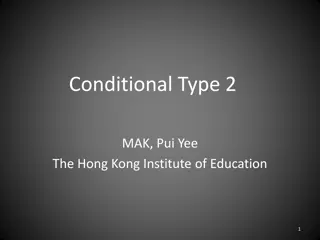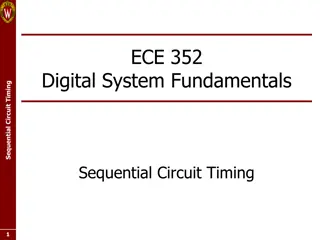API Tips and Tricks for Staff
Enhance your staff's efficiency with these API tips and tricks for accurate timekeeping, badge swiping policies, special codes usage, PTO requests, class sign-ups, and more. Ensure proper clocking basics and understand the importance of accurate timekeeping for streamlined operations at Duke Univers
1 views • 26 slides
Understanding Logical Form and Equivalence in Conditional Statements
Delve into the intricacies of logical form, equivalence, and compound statements in the realm of propositional logic. Explore valid and invalid arguments, conditional statements, and the logic of compound statements with puzzles to sharpen your logical reasoning skills. Unravel scenarios like determ
2 views • 81 slides
Understanding Conditional Probability and Bayes Theorem
Conditional probability relates the likelihood of an event to the occurrence of another event. Theorems such as the Multiplication Theorem and Bayes Theorem provide a framework to calculate probabilities based on prior information. Conditional probability is used to analyze scenarios like the relati
1 views • 5 slides
Bayesian Estimation and Hypothesis Testing in Statistics for Engineers
In this course on Bayesian Estimation and Hypothesis Testing for Engineers, various concepts such as point estimation, conditional expectation, Maximum a posteriori estimator, hypothesis testing, and error analysis are covered. Topics include turning conditional PDF/PMF estimates into one number, es
1 views • 16 slides
Mastering Excel: Filters, Conditional Formatting, and Data Validation
Learn how to use filters in Microsoft Excel to organize and display data efficiently. Discover the power of conditional formatting to automatically format cells based on specific criteria. Explore data validation to control and validate user input, ensuring accuracy and consistency in your worksheet
1 views • 18 slides
Understanding Conditional Statements in Logic
Conditional statements in logic involve connecting statements with an "if-then" structure. The truth of the conclusion is dependent on the truth of the hypothesis. Explore examples, truth tables, and logical equivalences to grasp the concepts of conditional statements.
0 views • 26 slides
Understanding Conditional Clauses in English Grammar
A conditional clause is a type of adverbial clause in English grammar that states a hypothesis or condition using a conditional clause in the simple present and the main clause in the future tense. This type of clause uses modal verbs like would, should, could, will, may, might, or can. Conditional
2 views • 6 slides
Understanding Branching Structures in Assembly Language
The content discusses branching structures in assembly language, focusing on conditional jumps, the CMP (compare) instruction, how the CPU implements conditional jumps, signed versus unsigned jumps, and using the JMP (jump) instruction for unconditional transfers of control. Examples and explanation
1 views • 24 slides
Comparison of SPI and I2C Communication in Embedded Systems
SPI and I2C are two common communication protocols used in embedded systems. SPI offers fast and easy point-to-point connections with no addressing needed, while I2C allows connecting multiple peripherals with just two wires. SPI has pros such as fast data transfer but cons like complexity with mult
1 views • 17 slides
Understanding Conditional Probability and Independence in Statistics
Conditional probability and independence are essential concepts in statistics. This lesson covers how to find and interpret conditional probabilities using two-way tables, calculate probabilities using the conditional probability formula, and determine the independence of events. Through examples li
0 views • 15 slides
TCP Manager Module Orientation Overview
The TCP Manager Module Orientation provides an in-depth look at the TimeClock Plus (TCP) system, including employee setup, time tracking, leave requests, and clocking rules. The system allows for seamless management of staff time and schedules, with features such as automatic time adjustments, accru
0 views • 14 slides
Understanding the Second Conditional in English Grammar
The second conditional in English grammar is used to talk about unlikely or impossible situations in the present or future. It involves using 'if' followed by the past simple, 'would', and the infinitive. This type of conditional is different from the first conditional as it deals with less likely s
0 views • 10 slides
Understanding Negations in Quantified and Conditional Statements
Explore the concept of negations in quantified statements, where the negation of a universal statement equates to an existential statement, and vice versa. Discover the importance of negations in universal conditional statements and their relationship to logical equivalence. Dive into examples of ne
0 views • 15 slides
Exploring Unusual Activities and Second Conditional Grammar
Delve into the realm of unusual activities and learn about the second conditional grammar in this engaging study. Discover vocabulary related to hypnotism, hair dyeing, and tarantulas. Explore how the second conditional is used to discuss improbable future scenarios and present impossibilities. Unde
1 views • 9 slides
Understanding Dynamic Voltage and Frequency Scaling in Advanced VLSI
Explore the concepts of Dynamic Voltage and Frequency Scaling (DVFS) in Advanced VLSI design. Learn about the impact on clocking, STA, and testing, as well as considerations for selecting the right voltage and frequency settings. Discover how controlling voltage affects power consumption and computa
0 views • 51 slides
Cutting-Edge Insights from the 26th General Congress of the SFP
Explore the latest advancements in THz-XUV pump probe experiments post the 2020+ upgrade at FLASH, DESY, presented by Ekaterina Zapolnova at the 26th General Congress of the SFP. Discover the intense XUV and THz radiation capabilities at FLASH, applications in structural and electron dynamics of mol
0 views • 13 slides
Understanding PHP Conditional Statements for Decision Making Logics
Conditional statements in PHP are essential for decision-making logics, allowing the execution of specific code blocks based on defined conditions. This article covers different types of conditional statements like if, if-else, if-elseif-else, and switch in PHP, along with syntax examples and their
0 views • 17 slides
Understanding Conditional Statements in Geometry
In this chapter of "Big Ideas Geometry," the focus is on conditional statements in geometry. Learn how to write conditional and biconditional statements, determine if statements are true or false, and explore logical implications such as converse and negation. Through examples and explanations, gras
0 views • 54 slides
Understanding Bayes Rule and Conditional Probability
Dive into the concept of Bayes Rule and conditional probability through a practical example involving Wonka Bars and a precise scale. Explore how conditional probabilities play a crucial role in determining the likelihood of certain events. Gain insights on reversing conditioning and applying Bayes
0 views • 35 slides
Conditional and Reference Class Linear Regression: A Comprehensive Overview
In this comprehensive presentation, the concept of conditional and reference class linear regression is explored in depth, elucidating key aspects such as determining relevant data for inference, solving for k-DNF conditions on Boolean and real attributes, and developing algorithms for conditional l
0 views • 33 slides
Understanding IF Conditionals in English Grammar
IF conditionals in English grammar introduce different kinds of conditions that may or may not happen, including the zero conditional, first conditional, second conditional, and third conditional. These conditionals are expressed through IF clauses followed by main clauses, each serving a specific p
0 views • 16 slides
Understanding the 4 Main Types of Conditional Sentences in English
Conditional sentences in English consist of two parts: the "if" clause and the main clause. There are four main types of conditional sentences - Zero Conditional, First Conditional, Second Conditional, and Third Conditional. Each type is used to express different conditions and outcomes based on cer
1 views • 16 slides
Understanding Conditional Sentences and Time Clauses
Conditional sentences are divided into real and unreal scenarios. Real conditionals, like zero and first conditionals, express present or future possibilities, while unreal conditionals, such as second and third conditionals, discuss imaginary or impossible situations. The use of "if" indicates less
0 views • 32 slides
English Grammar Practice: Conditional Sentences Type 3
Practice English grammar with a focus on conditional sentences type 3. The content includes examples and exercises to help improve understanding and usage of past perfect tense, conditionals, and past participle forms. Explore scenarios and complete sentences to enhance your skills in forming comple
0 views • 14 slides
Understanding Conditional Sentences (If Clauses) in English Grammar
This content provides insights into conditional sentences (if clauses) in English grammar, focusing on the First Conditional for talking about possible future events or situations. It explains the structure, usage, and examples of First Conditional sentences in different contexts such as predictions
0 views • 7 slides
Conditional Statements in Discrete Math: Logic Exercise Solutions
Practice writing conditional statements in English for various scenarios such as weather conditions, achievements, requirements, and guarantees. Understand the antecedent and consequent relationship in logic exercises. Common ways to express conditional statements explained with examples.
0 views • 5 slides
Efficient Mobile App Workflow Tips and Approval Rights Instructions
Improve your mobile app efficiency with tips on correct swiping, adding clocking requests, and forwarding approval rights. Learn about special codes, facilities, and department adjustments to streamline your workflow. Follow clear instructions and avoid missing clockings and incomplete swipes.
0 views • 7 slides
Understanding If Clauses in English Grammar
If clauses are a vital aspect of English grammar, serving to express conditions that must be met for specific outcomes. They come in four types, including the zero conditional for facts, the second conditional for unlikely situations, and the third conditional for past hypothetical scenarios. While
0 views • 28 slides
Payroll & Time Keeper New Hire Orientation in Finance Department - August 2021
Information on payroll and timekeeping procedures for new hires in the Finance Department, including contact details, logging in instructions, clocking in process, accessing the main menu, handling missed clock-ins, reviewing time sheets, and more.
0 views • 18 slides
English Conditional Sentences Practice Examples with Images
Explore a collection of English conditional sentences practice examples with accompanying images. From zero conditional to third conditional, learn how to construct sentences using different tenses and structures. Enhance your understanding of if-clauses and main clauses through these visual aids.
0 views • 21 slides
Understanding First Conditional Sentences with Examples
Learn about first conditional sentences in English grammar, how to form them using "if" and "will", and practice with various examples. Understand the usage of first conditional for future actions dependent on fulfilling certain conditions. Improve your understanding through examples and exercises p
0 views • 10 slides
First Conditional: Understanding and Examples
Explore the First Conditional tense with examples and practice exercises. Understand how to form conditional sentences with "if" clauses and main clauses. See how actions in the future depend on fulfilling certain conditions, illustrated through clear examples and explanations.
0 views • 10 slides
8-bit Timer/Counter2 with PWM and Asynchronous Operation
The 8-bit Timer/Counter2 with PWM and Asynchronous Operation features single compare unit, glitch-free operation, phase-correct PWM, frequency generator, clock prescaler, interrupt sources, and external clocking options. It includes registers for control, counter, output compare, asynchronous status
0 views • 14 slides
FPGA Data Converter Interfacing Overview
Explore various I/O formats for interfacing data converters with FPGAs, including ADC parallel and serial formats like CMOS, LVDS, DDR. Learn about clock edge alignment, parallel, and true serial formats. Understand the differences between SDR and DDR, as well as considerations for clocking and data
0 views • 32 slides
Understanding Conditional Sentences: Types and Usage Explained
Conditional sentences are complex sentences with a subordinate clause of condition, usually starting with "IF". Learn about zero, first, second, third, and mixed conditional sentences, their structures, and examples to enhance your understanding and usage of different types of conditionals.
0 views • 13 slides
Understanding JESD204B Physical Layer (PHY) in High-Speed Serial Interfaces
The JESD204B training presentation delves into the Physical Layer (PHY) of high-speed serial interfaces, covering topics such as speed grades, compliance types, SERDES solutions for long channels, clocking information, differential link data transmission, and electrical requirements for drivers and
0 views • 20 slides
Conditional Type 2 - If I Had a Million Dollars Revision
Learn about the second conditional type and practice forming conditional sentences using "If I had a million dollars" scenario. Understand the usage of the 1st conditional for discussing possible future situations and explore the consequences of hypothetical scenarios like having a bird on your head
0 views • 22 slides
Understanding Sequential Circuit Timing and Clock Frequency
Sequential circuit timing is crucial for designing digital systems. The minimum clock period, slack values, clock frequency, and critical paths play key roles in determining the operational speed and performance of sequential circuits. By analyzing flip-flop timing parameters, combinatorial logic de
0 views • 20 slides
Advanced VLSI - Dark Silicon and Power Management Challenges
Explore the complexities of VLSI design including the concept of dark silicon and the challenges of power management in modern microprocessors. Delve into strategies such as conditional clocking and DVFS to address these issues in the ever-evolving field of semiconductor technology.
0 views • 17 slides
Understanding Conditional Discharge in Mental Health: A Comprehensive Guide
Explore the complexities of conditional discharge in mental health, from its definition to planning for discharge and post-discharge care. Learn about conditions, frameworks, and recall procedures associated with this critical process. Delve deeper into the nuanced aspects of managing risks and prot
0 views • 31 slides
